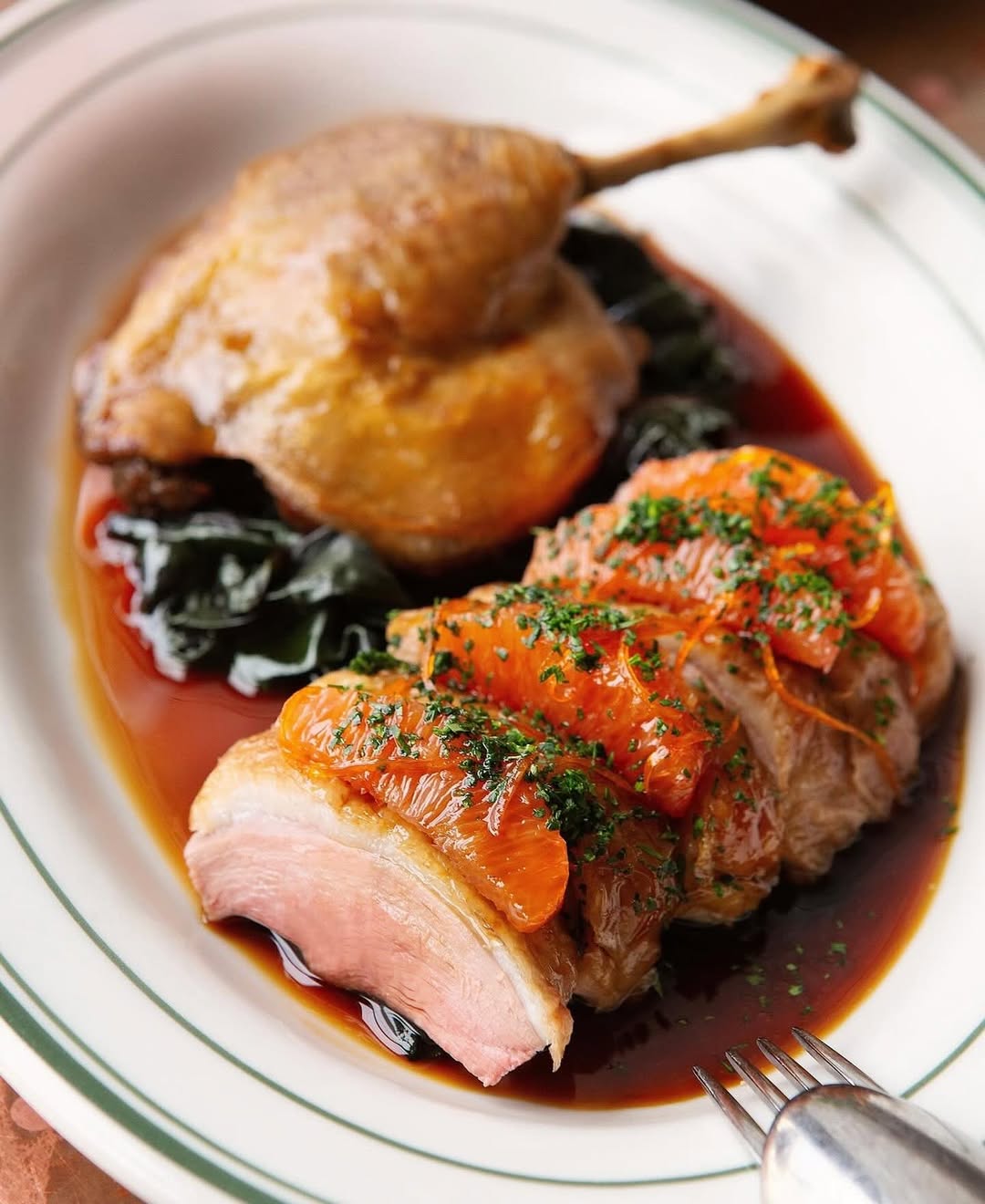Grilling duck doesn’t have to feel like a black-tie event. Sure, it sounds fancy – “grilled duck with citrus marinade” – but under all that elegance, it’s still just fire, fat, and flavor doing their thing.
I’ve grilled everything from ribs to rattlesnake, but duck? Duck’s a different kind of beautiful. It’s richer than chicken, juicier than steak, and once that skin crisps over the grill, it’s game over for boring poultry.
This grilled duck recipe gives you all the satisfaction of slow barbecue in under an hour. It’s got zesty citrus, smoky char, and that buttery duck fat magic that makes you feel like you’re cooking for royalty – even if you’re just grilling in flip-flops.
Let’s get into it.
Why Duck Deserves a Spot on Your Grill
Duck has a PR problem. People think it’s fussy, but really it just wants attention – not drama. The secret is balance: render the fat right, crisp the skin, and don’t overcook it.
Once you do that, duck rewards you with meat that’s tender, flavorful, and rich enough to make you forget chicken even exists.
The citrus marinade is what keeps this recipe elegant and bright. It cuts through the richness, adds a subtle tang, and brings out the smoky sweetness from the grill. Think of it as a pitmaster’s version of perfume – bold but balanced.
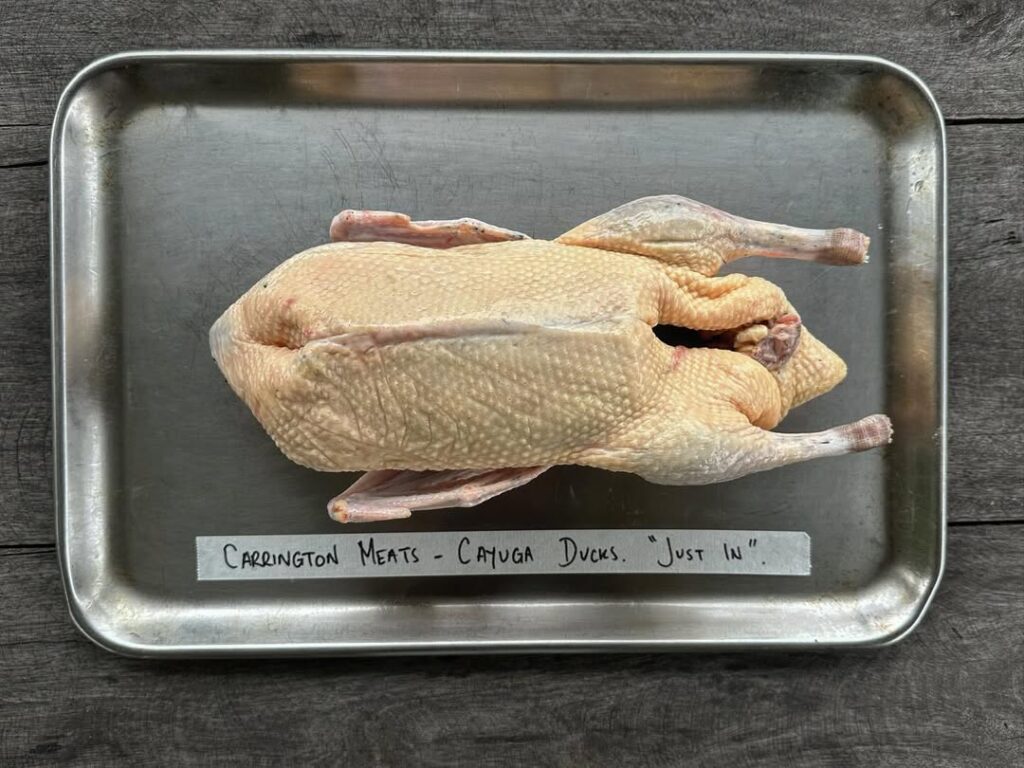
Choosing the Right Duck for Grilling
Before you fire up the grill, start with the right duck. Pekin ducks are mild and tender – the go-to for beginners. Muscovy ducks have leaner meat with a deeper, more gamey flavor, perfect if you like intensity.
Moulard ducks fall in between, with rich fat that crisps beautifully. Whatever you choose, go for skin-on breasts – that layer of fat is pure gold when rendered right.
If you can, buy fresh, not frozen, and avoid pre-scored cuts; you’ll want to score the skin yourself for even rendering.
Think of this as choosing your steak: fat equals flavor. Pick a quality bird, and the grill will do the rest – turning that duck into something smoky, crisp, and downright elegant.
How to Render Duck Fat Like a Pro
Here’s the make-or-break moment of duck grilling: rendering the fat. Rush it, and you’ll end up with chewy skin and flare-ups. Do it right, and you’ll get a crisp, golden crust that rivals bacon.
Start by scoring the skin in a crosshatch pattern – not too deep, just enough to help the fat escape. Then, place the duck skin-side down on a cold grill and slowly bring the heat up.
This gradual rise lets the fat melt out without burning.
Keep a drip pan underneath to catch that liquid gold – you’ll want it later for potatoes or eggs. Once the skin’s crisp and most of the fat’s rendered, move it to indirect heat to finish. That’s pitmaster precision meets French finesse.
Pairing Flavors: Beyond Citrus Marinades
The citrus marinade is a classic, but duck plays well with all kinds of flavors. Think of it like pairing wine – you’re just finding the right vibe. For something sweet and smoky, try a maple-soy glaze.
Craving bold spice? Go ginger-chili-lime. Want something earthy and elegant? Mix pomegranate molasses with rosemary. Duck’s natural richness stands up to strong flavors, so don’t be shy. The trick is balance: acid cuts the fat, sweet builds caramelization, and salt brings it all together.
Play around – a pitmaster’s job is half grilling, half experimenting. Just remember, the goal isn’t to hide the duck’s flavor but to frame it. The right marinade doesn’t steal the spotlight; it cues the entrance and lets the duck shine.
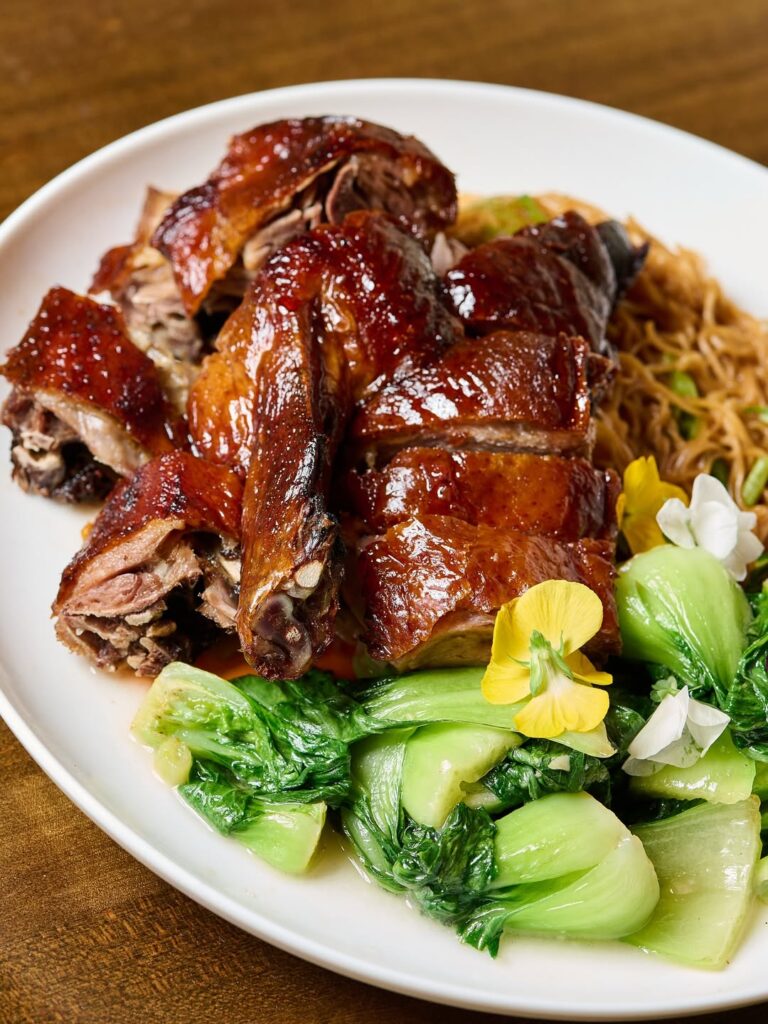
What to Serve with Grilled Duck
A dish this rich needs the right supporting cast. Duck’s smoky fat loves contrast – something crisp, tangy, or earthy to balance the bite. Go for grilled asparagus or broccolini if you want that charred green crunch.
Wild rice or roasted potatoes absorb the juices like pros. If you’re keeping things light, a citrus and arugula salad hits the same bright notes as the marinade. Feeling fancy? Creamy polenta or truffle mash makes it a full-on restaurant plate.
And yes, wine matters – Pinot Noir and Grenache are duck’s best friends, cutting through richness without overpowering it. The key is keeping it simple: the duck’s the star, your sides are the band. Together, they make the meal sing.
Common Duck Grilling Mistakes (and How to Fix Them)
Grilling duck isn’t complicated – it’s just unforgiving if you get careless. The biggest rookie mistake? Too much heat, too fast. That fat needs time to render. Start skin-side down and low.
Next, don’t skip the resting time – five to ten minutes lets the juices settle, so your beautiful sear doesn’t end in a puddle. Avoid flipping too often; duck likes commitment.
One good sear per side, that’s it. And if you see flames, don’t panic – just slide the duck to indirect heat.
Finally, don’t overcook it. Medium-rare (135°F / 57°C) is where duck shines – tender, juicy, and rich. Every pitmaster’s burned a bird or two getting here. Learn from it. Respect the fat, trust the heat, and the duck will never fail you.
Pitmaster Tips and Tricks
- Start skin-side down cold: helps render fat evenly.
- Save the duck fat: strain and keep it in a jar. It’s liquid gold for roasting potatoes or frying eggs.
- Watch your fire: indirect heat saves you from flare-ups.
- Don’t overthink it: Duck’s already flavorful. You’re enhancing, not hiding.
- Citrus variations: blood orange in winter, lime for a sharper edge, or grapefruit for bitterness.
Pitmaster logic: Duck doesn’t need much – just heat, patience, and a little respect. Treat it right, and it’ll return the favor tenfold.
Why This Grilled Duck Recipe Works
This isn’t just another grilled bird. The duck’s fat layer renders like bacon, crisping to perfection. The citrus marinade adds tang and freshness that lift the richness instead of fighting it.
And grilling brings smoke, texture, and that primal, flame-kissed taste you can’t fake in a skillet.
You get contrast in every bite – sweet, salty, smoky, and bright – all dancing together like a well-rehearsed jazz band.
It’s elegant enough for date night but easy enough for a lazy Sunday cookout.
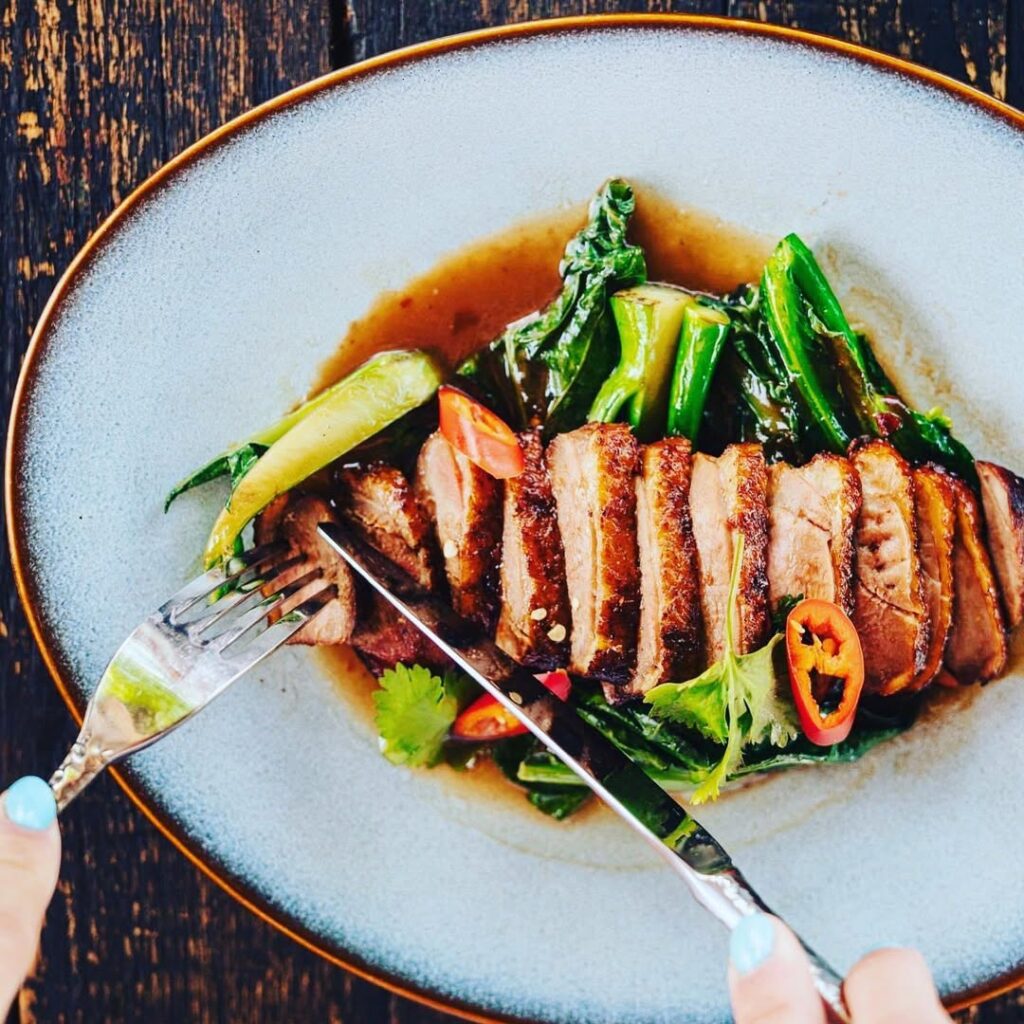
Final Thoughts
Once you’ve nailed this grilled duck recipe, you’ll realize duck isn’t just for French restaurants – it’s for your backyard grill, your weeknight dinner, and your next culinary flex.
It’s indulgent, yes, but in a grounded, confident way – like a pitmaster wearing a chef’s coat.
And if anyone asks for your secret, just tell them the truth:
“It’s all in the fire and a little bit of citrus.”
Now pour yourself something good and enjoy that first crispy, smoky, citrus-glazed bite. You’ve earned it.
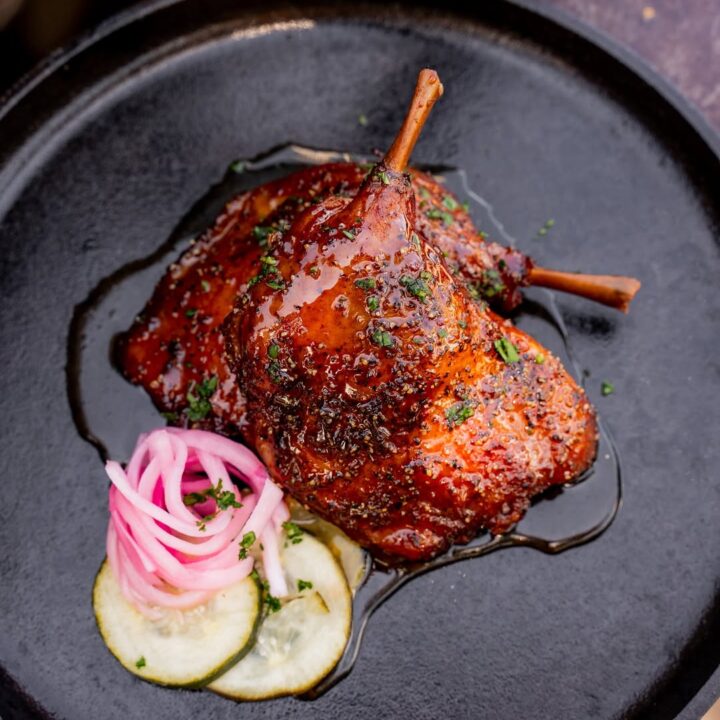
Grilled Duck with Citrus Marinade: Crispy, Smoky, and Bright
Image credit: @interstellarbbq
Ingredients
For the Duck:
- 2 duck breasts, skin-on (about 6 oz each)
- Salt and freshly cracked black pepper
For the Citrus Marinade:
- 1 orange (zested and juiced)
- 1 lemon (juiced)
- 2 tbsp soy sauce
- 1 tbsp honey
- 1 tbsp olive oil
- 2 cloves garlic, minced
- 1 tsp fresh thyme or rosemary
Optional:
- pinch of chili flakes for a little heat
Instructions
- Score and Season. Pat your duck breasts dry – like really dry. Moisture is the enemy of crisp skin. Use a sharp knife to score the skin in a crisscross pattern, being careful not to cut into the meat. This helps the fat render evenly and gives you that golden, glassy finish. Season both sides with salt and pepper. Don’t be shy here – duck is bold; it can handle it.
- Make the Citrus Marinade. Whisk together the orange juice, lemon juice, zest, soy sauce, honey, olive oil, garlic, and thyme in a small bowl. Taste it. If it makes you smile, it’s good. If it puckers your face, add a little more honey. Cooking’s about adjustment, not perfection. Pitmaster tip: always reserve a few tablespoons of marinade before adding the raw meat. You’ll use this later for glazing – and you’ll thank yourself later.
- Marinate the Duck. Place the duck in a zip-top bag or shallow dish and pour the marinade over it. Let it soak for 30 minutes to 2 hours in the fridge. Don’t go longer. Citrus is acidic, and too much time in the pool will start to “cook” the meat. We’re grilling, not making duck ceviche. Before grilling, pull the duck out and let it sit at room temperature for about 15 minutes. Cold meat on a hot grill equals uneven cooking – and we’re not here for that.
- Fire Up the Grill. You want medium-high heat, around 375–400°F (190–200°C). If you’re using charcoal, build a two-zone fire: one side for searing, one side for finishing. For gas, just turn one burner down a notch. Lightly oil your grates — duck fat plus grill grates can get messy fast. Pitmaster reminder: Duck fat drips, and duck fat flames. Keep an eye out for flare-ups unless you like the “extra crispy” look.
- Grill the Duck. Lay the duck skin-side down over the hot zone. You’ll hear the sizzle – music to any pitmaster’s ears. Let it cook about 5–7 minutes, until the skin is golden brown and crisp. Flip and move it to the cooler side. Cook for another 3–4 minutes for medium-rare or a bit longer if you prefer medium. Key point: Duck breast is best cooked to 135°F (57°C) internal temperature. Anything more and you lose the tenderness. Don’t rush it. Rendering fat takes time. If you push it too hard, you’ll get a greasy mess instead of that perfect crisp.
- Rest and Glaze. Rest your duck for 5–10 minutes after it leaves the grill. This lets the juices redistribute and keeps the meat tender. Meanwhile, pour your reserved marinade into a small saucepan and simmer it for 2–3 minutes until it thickens slightly. Brush it over the duck just before slicing for a glossy, citrusy glaze that looks straight out of a fine-dining kitchen. Slice the duck at an angle – skin side up – so everyone can see that beautiful pink interior and golden crust.
- Serve It Right. Keep your sides simple. This duck does all the talking. Try it with: A) Grilled asparagus or broccolini — adds a smoky green crunch, B) Wild rice or roasted potatoes – perfect for soaking up juices, C) Arugula salad with orange segments – echoes that citrus note in the duck If you’re pouring wine, grab a Pinot Noir or Grenache — both love duck as much as you do. Pro tip: Plate with confidence. A drizzle of glaze, a little zest on top, maybe a few thyme sprigs. Fancy without the fuss.
Featured image credit: @forksnroses

